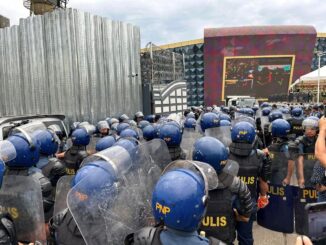
MANILA, Philippines — The Commission on Human Rights has launched an investigation into the death of a maritime academy cadet who was reportedly forced to perform physical exercises as punishment.
Second-year merchant marine cadet Vince Andrew Delos Reyes, 19, died in hospital after an upperclassman, identified only as “Nathaniel,” ordered him to do the strenuous exercises on July 8, an initial investigation by Calamba City police found. The alleged punishment was for a thumbs-up Delos Reyes accidentally sent to a group chat of the corps of cadets.
Delos Reyes was reportedly asked to perform 100 repetitions of squat thrusts, followed by 100 repetitions of pumping. The student collapsed while carrying out the star jump exercise, according to a report by GMA’s 24 Oras.
The cadet was rushed to the hospital but declared dead on arrival.
Calamba-based NYK-TDG Maritime Academy, where Delos Reyes was a cadet, has yet to release a statement about the incident. Officials of the training school reported the incident to the police the following day, July 9.
The CHR’s regional office in Region IV has opened a motu proprio investigation, or a probe launched of its own accord, into the incident, the commission said on Monday.
‘Zero tolerance’
“The Commission has zero tolerance for such actions. Such practices not only jeopardize the physical well-being of the student but also violate their dignity and rights,” CHR Chairperson Richard Palpal-latoc said in a statement.
The human rights body said it denounces any form of violence against students and described the incident as a “blatant violation of a student’s fundamental right to life and safety.”
“Severe physical punishments have no place in any educational institution,” the CHR chairperson said.
The upperclassman involved in the incident has been placed under the custody of the Calamba City Police Station and is facing charges of reckless imprudence resulting in homicide.
The Commission on Higher Education (CHED) last year acknowledged that its “hands are tied” when it comes to enforcing the blanket ban on hazing in all higher education institutions as it does not have the “quasi-judicial powers” needed to impose sanctions on schools with fraternities, CHED Director Frederick Farolan said.
Noting that schools have the right to exercise their academic freedom, Farolan said during a March 7 Senate committee hearing that the best the commission can do is monitor cases.
The Anti-Hazing Act was revised in 2018 to outright ban hazing and impose stiffer penalties on persons involved in carrying out violent initiation rites. The 1995 version of the law was amended after the death of University of Santo Tomas law freshman Horacio Castillo III from the hazing rites of fraternity Aegis Juris.
But despite the amended Anti-Hazing Act, the police still recorded “14 or 18” alleged violations of the law since 2018, many of which were dismissed, according to Police Brig. Gen. Jose Melencio Nartatez during the hearing.





Be the first to comment